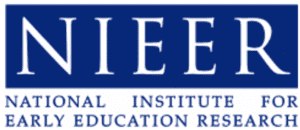Pre-K programs that support positive and long-lasting academic and social-emotional outcomes in children are thoughtfully designed. Effective city pre-K programs must support a quality experience for children by meeting certain standards such as teacher compensation and credentials, the use of a research-based curriculum and child assessments, and supports for teachers.
The following are examples of creative initiatives undertaken by city pre-K programs that are meant to enhance children’s learning opportunities, either through increasing access or developing and funding policies that support quality.* And while not all of these programs have earned a gold medal as defined by CityHealth’s pre-K medal criteria requirements, these initiatives show progress towards providing all children with high-quality pre-K.

In partnership with the National Institute for Early Education Research
*For a full description of policies that research shows positively support children’s learning outcomes in publicly-funded programs, see NIEER’s State of Preschool Yearbook.
Philadelphia – improving compensation: The mayor of Philadelphia recently announced a multimillion-dollar investment in early childhood that will fund signing and retention bonuses for Lead and Assistant teachers in all classrooms in Philadelphia that receive public funding, including PHLpreK teachers. The funds will provide a $2,000 bonus for Lead Teachers and a $1,500 bonus for Assistant Teachers if they commit to staying in their classroom for the upcoming school year. Additional funds from the investment will be used to support teachers through coaching and trainings focused on supporting children who have faced trauma or other challenges, and children who have behavioral or mental challenges. A recent report of early childhood educators across the state of Pennsylvania showed that about 50% of educators either do not plan to or are unsure if they will stay in their job for the next five years; the Office of Children and Families in Philadelphia hopes these bonuses help with teacher retention, particularly as many reported that salary had an impact on their decision to stay in the field.


Oakland – using data for decision-making: The city of Oakland has been using neighborhood-level data on children’s developmental outcomes to help inform early learning partners about the needs of the community. The assessment tool used, the Early Development Instrument (EDI), is completed by kindergarten teachers and measures multiple domains of development, including language and cognition, social competence, and emotional maturity. Data is compiled by neighborhood to provide a picture of where children are developmentally on track and what neighborhoods need additional supports. EDI results have been used to guide decisions about future early childhood programming.
Louisville – building a coalition to design a pathway to universal pre-K: In March 2024, Mayor Greenberg of Louisville, Kentucky, unveiled his five-year plan to create a pathway to universal pre-K. The plan was developed by the Mayor’s Early Learning Action Group. The 23 community members, including early childhood experts, worked collectively for six months drafting the plan. The plan included the creation of a non-profit entity, Thrive by 5 Louisville, to operate and administer the universal pre-K program for the city.
San Antonio – implementing model programs to improve all pre-K: Pre-K 4 SA, funded by a one-eighth cent sales tax approved by voters in 2012 and reauthorized in 2018, has become a model program, focused on centering elements of high-quality pre-K like an evidence-based curriculum and highly-qualified teachers. Independent evaluations of the program have continued to show that children are making greater-than-expected gains in areas like literacy and math. Pre-K 4 SA continues to prioritize teacher development for all early educators in San Antonio, offering PD opportunities for all teachers working with children from pre-K through third grade. Additionally, Pre-K 4 SA prioritizes training principals and other school district leaders to learn developmentally appropriate practices through the Early Learning Leadership Program (ELLP).
Anchorage – establishing a public-private partnership with a new tax on marijuana sales to improve programs and increase access: In April 2023, voters in Anchorage approved Proposition 14, a ballot measure that allocates an additional $5-6 million per year to early care and education through a 5 percent sales tax on marijuana purchases. A public-private partnership was formed soon after the proposition passed between the Municipality of Anchorage and the Alaska Children’s Trust to ensure appropriate usage of funds. Goals for the Anchorage Child Care and Early Education (ACCEE) Fund include supporting educator training, professional development, staffing and wages; supporting upkeep and development of facilities; and opening more early learning slots for families.


Boston – building continuity of learning Pre-K through 2nd Grade: Boston Public Schools introduced Focus on Early Learning, a model approach aimed at aligning content, instruction and teacher training and coaching from pre-K through second grade. This model includes efforts to align pre-K curriculum with the instruction taking place in kindergarten and early elementary. In addition, teachers are provided with coaching and professional development to support fidelity. Thus far, this alignment has shown some promising results for students, with better instructional alignment and curriculum fidelity seeming to support children in sustaining academic gains made in pre-K.

Seattle – providing professional development and recognition to improve bilingual instruction: Prioritizing dual language classrooms is important in the Seattle Preschool Program (SPP), which formed the SPP Dual-Language Initiative in 2019. In the 2022-23 school year, six of the 22 dual-language classrooms in Seattle completed the Soy Bilingue Early Childhood Education Classroom Accreditation. These classrooms served 471 children who speak languages including American Sign Language, Amharic, Cantonese, French, Mandarin, Vietnamese, Spanish, and Somali. This accreditation strengthens teachers’ skills to support children’s learning in multiple languages, including strategies in bilingual instruction and responsivity to the cultural and linguistic backgrounds of young children.
Charlotte – enhancing learning through mentoring, coaching, and peer-to-peer support: Supporting new teachers through mentorship and coaching is important to cultivating instructional skills and supporting wellbeing; Charlotte’s MECK Pre-K Program has purposely incorporated this research into their program by including pre-K teachers in the Beginning Teacher Support program, which provide supports for teachers in their first three years of teaching. In addition, all teachers have access to professional learning communities (PLCs) and regular professional development opportunities for teachers and assistants. Teachers with bachelor’s degrees are also eligible for the MECK pre-K Scholarship at UNC Charlotte, which provides tuition, educational supplies, and family care support so that teachers can obtain their birth-to-kindergarten license.


Denver – respecting parental choice with a mixed delivery model: The Denver Preschool Program (DPP) has been prioritizing a mixed-delivery preschool system, or one that is inclusive of public schools and non-public school settings including child care centers, family child care homes, and faith-based early learning centers since it began in 2007. On average, 60% of program tuition in DPP goes to public schools, and 40% goes to community providers. With the launch of the Colorado Universal Preschool program in the 2023-2024 school year, many families were able to combine funds from both programs, continuing to further access while prioritizing parent choice.


Washington, D.C. – fully funding high standards in a truly universal pre-K program for 3- and 4-year-olds: The nation’s capital has been offering free, universal pre-K for 3- and 4-year-olds for more than 15 years, and in the 2022-23 school year served 80 percent of 3-year-olds and 88 percent of 4-year-olds, far surpassing the nation’s average rates of access, particularly for 3-year-olds. D.C. additionally spends much more per child than the national average and focuses on requirements research shows support child development, including bachelor’s degrees for lead teachers and a pay scale in non-public school settings that is comparable to pay in public schools.
